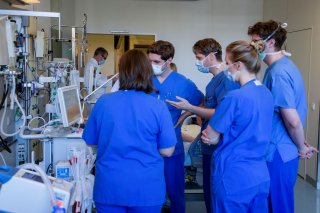The Mental and Physical Toll on Healthcare Workers Dealing With Coronavirus Is Massive, Yet Underreported
Why healthcare workers are among those most at risk.
Moral injury represents “perpetrating, failing to prevent, bearing witness to, or learning about acts that transgress deeply held moral beliefs and expectations”. It’s a situation in which, because of competition for limited resources, healthcare workers are not able to say: “We did everything we could.” Instead, they have to say: “We did what we could with the available resources.” Even experienced staff have expressed sadness and fear about the possibility of having to choose which patient gets a ventilator and ICU bed due to an overwhelmed health system. Let’s hope we never have to make such decisions.
Long-lasting effects?
For all the reasons above, it seems clear to us that working in healthcare during the COVID-19 pandemic will be associated with both short- and long-lasting psychological effects. For some of us, this might include post-traumatic stress disorder. Healthcare workers need to recognise this.
Rather than being invincible, we are actually highly vulnerable. We are already at higher risk of drug and alcohol abuse than workers from other sectors. This risk may ramp up during a pandemic as did mental and social illnesses during the Sars outbreak.
Healthcare workers signing up to respond to the 2014 West African Ebola outbreak were screened for character traits associated with resilience before being deployed. There is no such resilience screening for the COVID-19 response.
We have a keen sense of a duty of care for the mental and physical health of our patients. We would do well to remember that we also have a duty of care to ourselves.
![]()
Tom Wingfield, Infectious Diseases Physician and Senior Clinical Lecturer, Liverpool School of Tropical Medicine and Honorary Research Associate, University of Liverpool and Miriam Taegtmeyer, Professor of Global Health, Liverpool School of Tropical Medicine
This article is republished from The Conversation under a Creative Commons license. Read the original article.
Image: Reuters.

